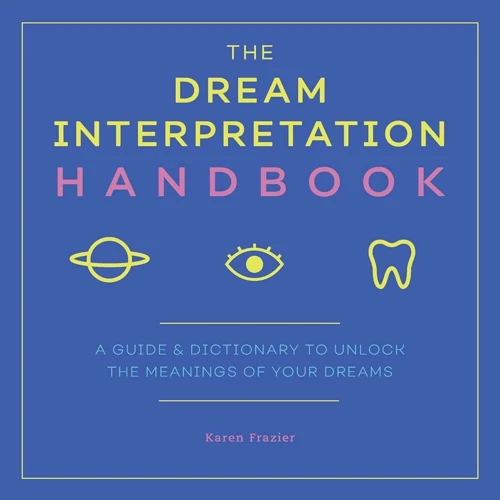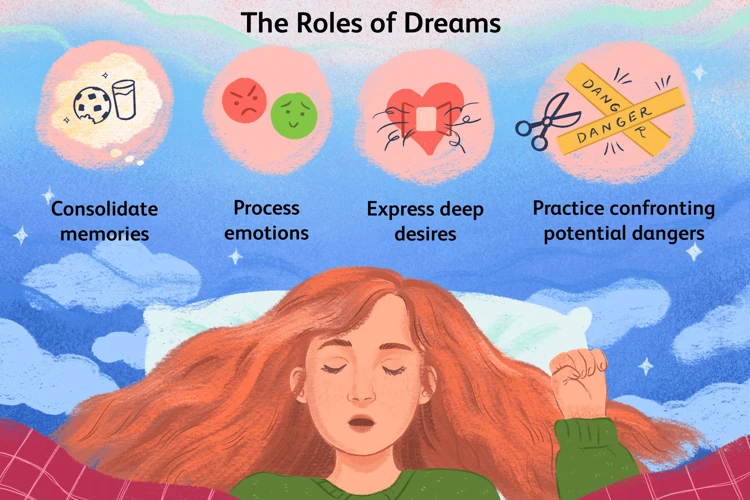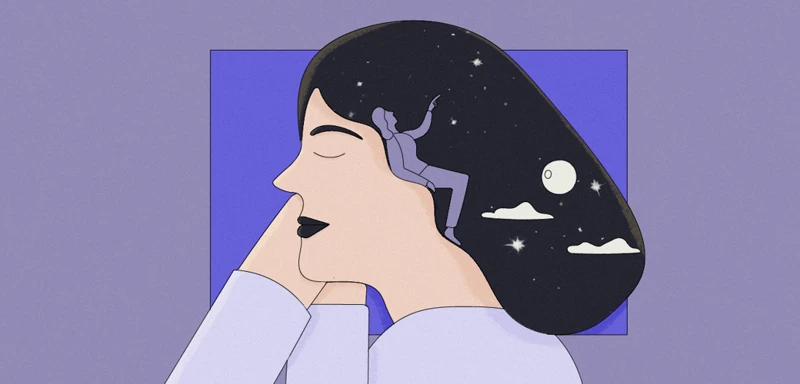Have you ever wondered why certain dreams keep coming back night after night, filling your mind with curiosity and intrigue? These recurring dreams hold a key to unlocking the secrets of your subconscious mind, providing valuable insights into your deepest thoughts and emotions. In this article, we will delve into the realm of recurring dreams, exploring their common themes and deciphering the hidden messages they hold. By understanding the symbols, emotions, and patterns within these dreams, you will gain a greater understanding of yourself and your life. So, get ready to take a journey into the depths of your own mind as we decode the messages in recurring dreams.
Understanding Recurring Dreams

Understanding Recurring Dreams: Curious about those dreams that seem to recur over and over again? Recurring dreams are a fascinating phenomenon that can provide valuable insight into our subconscious minds. These dreams are characterized by their repetition, appearing frequently throughout our lives. While there can be variations in the scenarios and settings, the core theme or symbol remains consistent. By unraveling the meaning behind these dreams, we can unravel the secrets of our subconscious. In order to fully comprehend recurring dreams, it’s important to explore what they are and the common themes that arise within them. By doing so, we can gain a deeper understanding of ourselves and the messages our subconscious is trying to convey. Some common themes in recurring dreams include falling, flying, being chased or attacked, being unprepared for an exam, and being lost or unable to find something. Each of these themes as its particular significance, which we will delve into further in the following sections.
What are recurring dreams?
Recurring dreams are a type of dream that repeats itself with a consistent theme, symbol, or scenario. Unlike regular dreams that we may forget upon waking up, recurring dreams leave a lingering impression on our subconscious. These dreams can occur over a period of days, months, or even years, and tend to recur with similar details and emotions. They can be vivid and intense, leaving us with a sense of familiarity and déjà vu. Recurring dreams often serve as a signal from our subconscious mind, highlighting unresolved issues, hidden emotions, or patterns in our lives that require attention and understanding. They provide an opportunity for self-reflection and personal growth. It’s important to pay attention to these dreams and explore their meanings, as they may hold valuable insights into our overall well-being and psyche.
Common themes in recurring dreams
Common Themes in Recurring Dreams:
Recurring dreams often share common themes that appear repetitively in different variations. These themes serve as a gateway to understanding the underlying messages and meanings hidden within our dreams. Here are some of the most common themes that can occur in recurring dreams:
- Falling: Falling dreams are one of the most prevalent recurring dream themes. They often symbolize a lack of control or a fear of letting go in waking life. The sensation of falling can represent a sense of insecurity or instability. These dreams may indicate a need to regain control over a particular aspect of your life or to address unresolved fears or anxieties. If you want to explore the deeper meaning of falling dreams, you can find more information here.
- Flying: Dreams about flying can be exhilarating and liberating. They signify a sense of freedom, empowerment, and transcendence. Flying dreams may represent a desire for escape or a need to rise above challenging situations. They can also reflect a sense of confidence and personal growth. If you want to explore the symbolism behind flying dreams, you can find more information here.
- Being chased or attacked: The theme of being chased or attacked is a common source of anxiety in recurring dreams. These dreams often symbolize feelings of fear, vulnerability, or unresolved conflicts. They may indicate a need to confront your fears or deal with unresolved issues in your waking life. Exploring the symbolism behind these dreams can provide valuable insights into your emotional state and help you address any underlying concerns.
- Being unprepared for an exam: Dreams about being unprepared for an exam are often associated with feelings of anxiety, pressure, or a fear of failure. These dreams may reflect insecurities about your abilities or a fear of being judged by others. They can also signify a need for better preparation or a desire to prove yourself. By examining these dreams, you can uncover areas of self-doubt and work towards building confidence and self-assurance.
- Being lost or unable to find something: Recurring dreams of being lost or unable to find something can symbolize a sense of confusion, uncertainty, or a fear of not knowing your true path. These dreams may suggest a need for guidance or a search for meaning and purpose. By reflecting on these dreams, you may discover hidden desires or unresolved issues that require attention and clarity.
Understanding these common themes and their potential interpretations can serve as a starting point for unraveling the messages in your recurring dreams. As you explore further, you will gain a deeper understanding of the unique symbolism and personal significance embedded within these dreams.
Deciphering Dream Symbols

Deciphering Dream Symbols: Dreams are often filled with symbols that hold a deeper meaning beyond their literal interpretation. Decoding these symbols is a key step in unraveling the secrets of your recurring dreams. When it comes to interpreting dream symbols, it’s important to understand that each symbol can have a personal significance based on your own experiences and emotions. While some symbols may have commonly accepted meanings, it’s essential to personalize the interpretation to fit your unique context. For example, water is a symbol that frequently appears in dreams and can represent emotions, purification, or a sense of renewal. By exploring the significance of water in dreams, you can gain a deeper understanding of your own emotional state and the messages your subconscious is trying to convey. So, pay close attention to the symbols that appear in your recurring dreams and take the time to reflect on their personal meaning.
Interpreting symbols and their meanings
When it comes to decoding the messages in our recurring dreams, understanding the symbols and their meanings is crucial. Symbols in dreams often represent deeper, unconscious aspects of ourselves or significant events in our lives. Each symbol can have multiple interpretations, depending on personal experiences and cultural influences. To interpret these symbols accurately, it is essential to consider the context of the dream and the emotions associated with it. For example, dreaming about water can symbolize emotional depth, cleansing, or the flow of life. The significance of water in dreams can vary depending on the dreamer’s personal experiences and associations with water. By reflecting on the emotions evoked by a symbol and considering its various possible interpretations, we can begin to unravel the hidden meanings embedded in our recurring dreams.
Personalizing dream symbols
- Explore Your Personal Associations: Dive deep into your own personal experiences and memories to understand the symbols in your recurring dreams. Ask yourself what each symbol means to you personally. For example, if you constantly dream about water, think about your personal relationship with water. Do you find it calming or terrifying? Does it represent emotions or change in your life? By personalizing the symbolism, you can unlock a more accurate interpretation of your dreams.
- Consider Cultural and Historical Contexts: Symbols and their meanings can vary across different cultures and time periods. Take into account the cultural and historical significance of certain symbols to gain a broader understanding. For example, a snake can represent wisdom and transformation in some cultures, while in others it may symbolize deceit or danger. Researching the symbolism of different cultures can provide a more comprehensive interpretation of your dream symbols.
- Reflect on Recent Events and Emotions: Pay attention to any recent events or emotions that may influence the symbolism in your dreams. Your dreams often reflect your current state of mind and can serve as a way for your subconscious to process and digest recent experiences. For example, if you had a stressful day at work, you may dream about being chased, symbolizing the feeling of being pursued or overwhelmed.
- Trust Your Intuition: Sometimes, your gut feeling can provide valuable insights into the meaning of dream symbols. Trust your intuition and go with your initial interpretations. Your intuition can tap into your subconscious knowledge and guide you towards a more accurate understanding of your dreams. Don’t be afraid to think outside the box and consider unconventional interpretations that resonate with your intuition.
- Keep a Dream Journal: Keeping a dream journal can help you track recurring symbols and their meanings over time. Write down your dreams immediately after waking up to capture the details and emotions associated with each dream. By regularly reviewing your dream journal, you may notice patterns and connections that can deepen your understanding of the symbolism in your recurring dreams.
Unveiling Hidden Emotions

Unveiling Hidden Emotions: Recurring dreams often serve as a portal to our deepest emotions and unresolved issues. Within the realm of these dreams, our subconscious mind becomes a canvas for the expression of intense emotions and unspoken thoughts. Through careful examination, we can identify and interpret the emotions that manifest in our recurring dreams. These dreams may bring up feelings of fear, anxiety, sadness, or even joy. It is important to pay attention to these emotions as they can provide valuable clues about areas of our lives that require attention or healing. Recurring dreams can shine a light on unresolved issues from our past or present, giving us an opportunity to confront and address them head-on. By unpacking the emotional content of these dreams, we can gain a deeper understanding of ourselves and foster personal growth and healing.
Identifying emotions in recurring dreams
Identifying Emotions in Recurring Dreams
Emotions play a significant role in our recurring dreams, serving as a window into our subconscious feelings and experiences. Identifying and understanding these emotions can provide valuable insights into our inner world.
1. Pay attention to the intensity: One way to identify the emotions present in recurring dreams is to assess their intensity. Take note of how strongly you feel during the dream. Are you overwhelmed by fear, anger, or sadness? The level of intensity can give clues about the significance of the emotions and their impact on your waking life.
2. Recognize recurring patterns: Another way to identify emotions in recurring dreams is to look for recurring patterns. Examine if there is a particular emotion that tends to show up frequently. For example, if you often find yourself feeling anxious or fearful in your recurring dreams, it suggests that these emotions may be deeply embedded in your subconscious and worth exploring further.
3. Connect with personal experiences: Emotions in recurring dreams are often tied to personal experiences and memories. Reflect on your past experiences and try to connect them with the emotions you feel in your dreams. This can provide valuable insights into unresolved issues or unexpressed feelings that may be impacting your subconscious mind.
4. Use dream symbols as a guide: Sometimes, the emotions in recurring dreams are not explicitly expressed but are instead symbolized through dream imagery. Pay attention to the symbols and metaphors present in your dreams, as they can provide clues about the hidden emotions. For example, water may symbolize deep emotions or the subconscious mind.
5. Keep a dream journal: Keeping a dream journal can be immensely helpful in identifying and understanding the emotions in recurring dreams. Write down your dreams as soon as you wake up, focusing on the emotions you experienced during the dream. Over time, patterns and themes may emerge, allowing you to gain a deeper understanding of your recurring dreams and their emotional significance.
By actively identifying and exploring the emotions in your recurring dreams, you can gain greater self-awareness and uncover insights that can positively impact your daily life.
Unresolved issues and recurring dreams
Unresolved issues and recurring dreams: Recurring dreams often serve as a mirror to our unresolved issues and emotional baggage. These dreams act as a gentle reminder from our subconscious that there are unresolved aspects of our lives that require attention and resolution. The repetitive nature of these dreams indicates that there are persistent thoughts and emotions that we have not effectively addressed or processed.
When experiencing recurring dreams, it’s essential to pay close attention to the emotions that arise within them. These emotions can provide valuable clues to the unresolved issues we are facing. Whether it is fear, anxiety, sadness, or frustration, these emotions are indicators of what needs to be addressed. For example, if you consistently dream of being betrayed by a loved one, it may signify an unresolved issue of trust or a fear of vulnerability.
By exploring and understanding the emotions associated with these dreams, we can begin to identify the specific areas of our lives that require attention and healing. It may be helpful to seek the guidance of a professional, such as a therapist or counselor, who can help navigate these unresolved issues and provide support in the resolution process. Additionally, journaling about your recurring dreams can assist in gaining deeper insights and reflection on the underlying unresolved issues.
Once we acknowledge and address these unresolved issues, the frequency and intensity of recurring dreams may diminish. It is through this process of self-reflection and healing that we can find personal growth and transformation. By confronting our unresolved issues and taking steps toward resolution, we pave the way for a more fulfilling and balanced life.
Reflecting on Life Patterns

Reflecting on Life Patterns: Recurring dreams have a unique way of reflecting the patterns and events that occur in our waking lives. These dreams often serve as a metaphorical mirror that allows us to recognize and understand the patterns and themes that shape our experiences. By paying attention to the recurring elements and symbols in our dreams, we can start to recognize the patterns and their significance. These patterns can relate to relationships, career choices, personal habits, or even our own emotional patterns. Recognizing and analyzing these patterns can provide us with valuable insights and help us make conscious choices to change or embrace certain aspects of our lives. Whether it’s a dream about constantly being late, getting lost, or encountering the same people or situations repeatedly, the recurrence of these themes points to a deeper connection between our dreams and our waking lives. By reflecting on these patterns, we can gain a better understanding of ourselves and navigate our lives with greater clarity.
Recognizing patterns and their significance
Recognizing patterns and their significance is an essential aspect of understanding recurring dreams. As we explore our recurring dreams, we may start to notice specific patterns emerging. These patterns can manifest in various ways, such as recurring symbols, situations, or emotions. By paying close attention and keeping a dream journal, we can begin to identify these patterns and uncover their deeper meaning. One common pattern is the repetition of certain symbols or objects in our dreams. For example, seeing water often in our dreams might indicate a connection to our emotions and our subconscious desires. Another pattern to look out for is the recurrence of certain situations or scenarios. For instance, finding ourselves constantly in a state of being lost or unable to find something could reflect feelings of confusion or a lack of direction in our waking life. By recognizing these recurring patterns, we can start to decipher the messages and insights that our subconscious mind is trying to convey.
Relationship between recurring dreams and life events
There is a deep and intricate connection between recurring dreams and the events that unfold in our waking lives. Our dreams often serve as a reflection of our emotions, experiences, and subconscious thoughts. When we experience recurring dreams, it indicates that there is a pattern or theme in our lives that we need to pay attention to. These dreams may be triggered by significant life events, unresolved issues, or underlying emotions that we may not be consciously aware of. By analyzing the content and symbolism of recurring dreams, we can gain valuable insights into our experiences and how they impact our thoughts and actions.
For example, let’s say you have a recurring dream where you are constantly losing your way and unable to find your destination. This dream could be indicative of feeling lost or uncertain in your waking life, perhaps in terms of your career, relationships, or personal goals. It’s a sign that you may be grappling with a sense of direction, and it’s important to take a closer look at the choices and decisions you are making.
Similarly, recurring dreams of being chased or attacked can symbolize underlying fears, anxieties, or conflicts that we may be experiencing in our day-to-day lives. These dreams often arise in response to situations where we feel threatened, stressed, or overwhelmed. By recognizing these patterns in our dreams, we can begin to address and resolve the issues that are causing us distress in waking life.
It’s important to note that the relationship between recurring dreams and life events is highly individualistic. While there are common symbols and themes that can offer general interpretations, it’s crucial to personalize the analysis of your dreams based on your unique circumstances and experiences. Reflecting on your recurring dreams in the context of your own life events can provide profound insights into your subconscious mind and guide you towards personal growth and self-discovery.
Tapping into the Collective Unconscious

Tapping into the Collective Unconscious: Recurring dreams provide a unique window into the collective unconscious, a realm of shared symbols and archetypes that connect all of humanity. When we experience recurring dreams, we tap into this vast well of collective knowledge and symbolism that has been passed down through generations. Archetypes, such as the hero, the wise old man, or the femme fatale, manifest in our dreams and carry deep and universal meanings. By exploring these archetypes, we can gain a profound understanding of ourselves and our place in the world. Additionally, recurring dreams often contain symbols that hold collective significance. These symbols, such as water or mirrors, hold universal meanings that transcend individual experiences. By deciphering these symbols, we can uncover profound insights into our lives and the human condition. So, as we explore the messages within our recurring dreams, let us not overlook the rich tapestry of collective unconsciousness that they draw from.
Exploring archetypes in recurring dreams
- The Hero: The hero archetype is often depicted as a brave and courageous figure who embarks on a journey or quest to overcome obstacles and save the day. In recurring dreams, the hero archetype may manifest as the dreamer themselves or as a separate character. These dreams may symbolize the need for the dreamer to tap into their inner strength and face challenges head-on.
- The Shadow: The shadow archetype represents the dark and repressed aspects of ourselves that we often try to avoid or hide from the world. In recurring dreams, the shadow may appear as a menacing figure or villain. These dreams can serve as a reminder to confront and integrate our own shadow qualities, acknowledging and embracing all parts of ourselves.
- The Wise Old Man/Woman: The wise old man or woman archetype represents wisdom, guidance, and mentorship. In recurring dreams, this archetype may appear as a wise figure offering advice or insight. These dreams can be a signal to listen to our inner wisdom and seek guidance from mentors or trusted individuals in our waking life.
- The Lover: The lover archetype symbolizes connection, desire, and deep emotions. In recurring dreams, the lover may manifest as a romantic partner or a symbol of passionate love. These dreams can reflect a need for emotional intimacy, a desire for connection, or unresolved feelings in relationships.
Other common archetypes that may appear in recurring dreams include the trickster, the caregiver, the explorer, and the artist. Each archetype carries its own unique meaning and message within the context of recurring dreams. Exploring and deciphering these archetypes can provide a deeper understanding of our subconscious desires, fears, and unresolved emotions.
Collective symbols and their interpretation
Collective symbols and their interpretation: In the realm of recurring dreams, there are symbols that go beyond our individual experiences and tap into the collective unconscious. These collective symbols hold universal meanings and interpretations that go beyond personal associations. Examples of collective symbols include animals, natural elements, and mythical creatures. Each symbol carries its own significance and can provide valuable insights into our dreams. For instance, the image of a snake is often associated with transformation and healing, while a butterfly symbolizes growth and metamorphosis. These symbols have been recognized and interpreted across cultures and throughout history. When analyzing recurring dreams, it is important to consider the collective meaning of these symbols and how they relate to your personal subconscious. By understanding the collective symbolism within your dreams, you can gain a broader perspective on their messages and discover hidden aspects of your psyche. It is worth noting that while collective symbols hold general meanings, personal associations with these symbols can add additional layers of interpretation. It is essential to consider both the collective and personal significance of these symbols when decoding the messages in recurring dreams.
Interpreting Recurring Dream Scenarios

Interpreting Recurring Dream Scenarios: Recurring dreams often manifest in specific scenarios or situations that repeat themselves over time. Two common recurring dream scenarios are falling dreams and flying dreams. Falling dreams typically evoke a sense of vulnerability and loss of control, reflecting feelings of insecurity or fear in waking life. These dreams may indicate a lack of stability or a fear of failure. On the other hand, flying dreams symbolize liberation, freedom, and a sense of empowerment. They can signify the desire to break free from constraints or the ability to rise above challenges. While these interpretations provide general insight, it’s important to note that dream symbolism is deeply personal and can vary for individuals. It is crucial to analyze the specific emotions and contexts of recurring dream scenarios to gain a more accurate understanding of their meaning and significance.
Falling dreams and their meaning
We’ve all experienced that sensation of falling in dreams, often accompanied by a jolt that wakes us up with a start. Falling dreams can be quite unsettling, but they hold significant meaning in the realm of dream analysis. These dreams are often associated with feelings of insecurity, loss of control, or an impending failure in some aspect of your life. The sensation of falling symbolizes a lack of stability or a fear of failure. It could also indicate a fear of letting go or a lack of trust in oneself. However, it’s essential to consider the specific context of the dream and your personal experiences to fully interpret its meaning. For example, if you’re falling from a great height and feel a sense of exhilaration, it could symbolize a desire for freedom or taking risks in your waking life. On the other hand, if you experience extreme fear or panic during the fall, it may suggest that you’re feeling overwhelmed or out of control in a particular situation.
It’s important to note that the meaning of falling dreams can vary significantly from person to person due to individual experiences and emotions. To gain a deeper understanding of your recurring falling dreams, keep a dream journal to record the details and emotions associated with each dream. Look for patterns and commonalities between the dreams to identify underlying themes and recurring symbols. This self-analysis can provide valuable insights into your subconscious mind and help you decipher the messages conveyed by your falling dreams. Remember, dreams are highly personal, and the interpretation should be tailored to your unique experiences and emotions.
Flying dreams and their meaning
Flying dreams and their meaning:
One of the most exhilarating recurring dream experiences is the sensation of flying. In these dreams, individuals find themselves soaring through the sky, effortlessly gliding above the world below. Flying dreams are often associated with freedom, liberation, and a sense of empowerment. They symbolize a desire to break free from restrictions and limitations, both in waking life and within the subconscious mind.
When analyzing the meaning behind flying dreams, it is essential to consider the specific details and emotions experienced during the dream. For example, if the dreamer feels joy and euphoria while flying, it may signify a sense of achievement, personal growth, and confidence. It can indicate a newfound freedom or the ability to rise above challenges and obstacles. On the other hand, if the dreamer is fearful or struggling to maintain flight, it may suggest unresolved fears, anxieties, or feelings of insecurity.
The interpretation of flying dreams can also vary based on the dreamer’s personal experiences and aspirations. Some individuals may associate flying dreams with a desire for adventure, exploration, and a longing to escape mundane routines. These dreams can serve as a reminder to embrace a more daring and adventurous approach to life.
Another possible interpretation of flying dreams is that they represent a need for control. In waking life, individuals may feel a lack of control over their circumstances or uncertain about the direction of their lives. Flying dreams can be a manifestation of the subconscious desire to take control, showing the dreamer that they have the power to navigate through life’s challenges and chart their own course.
Flying dreams symbolize freedom, empowerment, and the desire for personal growth. They can reflect feelings of liberation, adventure, and a longing for control. Analyzing the emotions and details within the dream, as well as considering personal experiences and aspirations, can provide a deeper understanding of the meaning behind one’s recurring flying dreams.
Common Recurring Dream Themes

When it comes to recurring dreams, there are several common themes that often emerge in our subconscious minds. These themes serve as a window into our deepest fears, anxieties, and unresolved issues. One common recurring dream theme is being chased or attacked, which can symbolize a feeling of being pursued or threatened in our waking lives. This type of dream may stem from a sense of vulnerability or a need to confront and overcome obstacles. Another recurring theme is being unprepared for an exam, reflecting feelings of inadequacy, performance anxiety, or a fear of failure. This dream may indicate a need for more preparation or a desire for validation and success. Additionally, being lost or unable to find something in a dream often represents a sense of disorientation or a struggle to navigate through life’s challenges. This theme may be associated with feelings of uncertainty, indecision, or a lack of direction in life. By recognizing and exploring these common dream themes, we can gain valuable insights into our subconscious and take steps towards personal growth and self-understanding.
Being chased or attacked
Being chased or attacked: One of the most common recurring dream themes is the sensation of being chased or attacked. These dreams can be incredibly intense and often leave us feeling anxious and fearful upon waking. The symbolism behind being chased or attacked can vary depending on the individual and the specific details of the dream. In many cases, being chased in a dream reflects a desire to avoid or escape from a certain situation or emotion in our waking lives. It may indicate that we feel overwhelmed, threatened, or pursued by something or someone. This could be related to work, relationships, or even unresolved issues from our past. Alternatively, being attacked in a dream can represent our own self-criticism or feelings of being under attack by others. It may indicate a fear of vulnerability or a need to defend ourselves in some aspect of our lives. These dreams often serve as a reminder to confront and address the underlying fears or challenges we face. To better interpret the meaning behind being chased or attacked in your dreams, it is helpful to pay attention to the specific details and emotions experienced during the dream. Keeping a dream journal can assist in identifying recurring patterns and symbols, helping you unlock the subconscious messages hidden within.
Being unprepared for an exam
Being unprepared for an exam: One common recurring dream theme that many people experience is the sensation of being unprepared for an exam. This dream often invokes feelings of anxiety, stress, and unease. The scenario typically involves finding oneself in an exam room or classroom, realizing that the exam has already started or that there is an upcoming exam for which they are completely unprepared. The dreamer may feel overwhelmed, scrambling to find study materials or desperately trying to remember any of the information they were supposed to have learned. This recurring dream can signify a fear of failure or a sense of insecurity in one’s abilities. It may also reflect real-life situations where the dreamer feels unprepared or lacking confidence in a particular area of their life. It is important to pay attention to the emotions and sensations triggered by this dream, as they can provide valuable insights into the dreamer’s subconscious fears and anxieties. By exploring the root causes of these feelings, individuals can work towards overcoming insecurities and building self-assurance in their waking life.
Being lost or unable to find something
One common recurring dream theme is the sensation of being lost or unable to find something. This dream often evokes feelings of frustration, anxiety, and even panic. It may manifest in various scenarios, such as wandering in unfamiliar places, searching for a specific object or person, or being unable to find your way home. Each variation of this dream theme carries its own unique message from your subconscious.
When you dream of being lost or unable to find something, it typically reflects a sense of uncertainty or a lack of direction in your waking life. It may indicate that you are feeling lost or confused about your goals, your purpose, or your path in life. This dream theme can also suggest that you are searching for something that is missing in your life, whether it’s a missing piece of the puzzle, a sense of belonging, or a deeper understanding of yourself.
Being lost in a dream can also symbolize feelings of being overwhelmed or out of control. It may point to a situation in your life where you feel disoriented or unsure about how to navigate through challenges or make important decisions.
In order to decipher the message behind this recurring dream theme, it’s important to reflect on your current circumstances and emotions. Consider if there are any areas in your life where you feel lost, uncertain, or in search of something. Reflect on whether you need to take steps to regain a sense of direction, seek guidance or support, or make changes that align more closely with your authentic self.
It’s also worth noting that being lost in a dream can sometimes be a reminder to trust your instincts and intuition. It may indicate that you need to rely less on external influences or opinions and listen more closely to your inner wisdom when making choices or navigating through life’s uncertainties.
Lucid Dreaming and Recurring Dreams

Lucid Dreaming and Recurring Dreams: Lucid dreaming, the ability to become aware and conscious within a dream, holds great potential for exploring and understanding recurring dreams. When we become lucid in a recurring dream, it presents a unique opportunity to actively engage with the dream’s symbols and messages, as well as gain a deeper understanding of ourselves. By recognizing that we are dreaming while in the midst of a recurring dream, we can take control of the dream narrative and actively explore its meaning. Lucid dreaming allows us to confront our fears, resolve conflicts, and gain insights that may otherwise be hidden beneath the surface of our subconscious mind. It offers a powerful tool for self-discovery and problem-solving. Through lucid dreaming, we can tap into the rich tapestry of our recurring dreams, unraveling their secrets and harnessing their potential for personal growth and transformation.
How to become lucid in recurring dreams
Lucid dreaming is an exciting phenomenon where you become aware that you are dreaming while still in the dream. This awareness allows you to have control over the dream and actively participate in shaping its course. Becoming lucid in recurring dreams can be a powerful tool for gaining deeper insights into your subconscious mind.
To become lucid in recurring dreams, it is crucial to develop a practice of reality checks during your waking hours. Reality checks involve questioning the nature of your reality by examining your surroundings and questioning whether you are dreaming or awake. Some common reality checks include pinching yourself, looking at a clock, or trying to push your hand through a solid object. By regularly performing reality checks during the day, you train your mind to question your waking reality. Eventually, this habit will carry over into your dreams, enabling you to recognize the inconsistencies and peculiarities that indicate a dream state.
Another technique for becoming lucid in recurring dreams is to set intentions before falling asleep. As you lie in bed, visualize yourself becoming aware in your recurring dream. Repeat affirmations such as “I will recognize that I am dreaming” or “I will become lucid when I encounter [specific dream symbol].” By impressing these thoughts into your subconscious mind, you increase the likelihood of becoming lucid when the dream scenario arises.
A helpful practice is to keep a dream journal by your bedside and record your recurring dreams as soon as you wake up. Regularly reviewing your dreams can help you identify patterns and triggers that lead to lucidity. Additionally, the act of writing down your dreams strengthens your dream recall abilities, making it easier to remember and analyze them.
For those who want to take their lucid dreaming practice further, there are various techniques and exercises to explore. One such technique is “reality testing” within dreams, where you conduct reality checks to verify if you are dreaming or not. This can include jumping in an attempt to fly or looking at a reflection to see if your image appears distorted. Additionally, you can try to communicate with the dream characters or explore different dreamscapes to deepen your lucid dreaming experiences.
Remember, becoming lucid in recurring dreams requires patience, practice, and dedication. It may take time to achieve consistent lucidity, but the rewards of self-discovery and exploration are well worth it. So, embrace the world of lucid dreaming and unlock the limitless possibilities that lie within your recurring dreams.
Using lucid dreams for self-discovery and problem-solving
Using lucid dreams for self-discovery and problem-solving:
Lucid dreaming, the state of being aware that you are dreaming while in the dream, offers a unique opportunity for self-discovery and problem-solving. When you are lucid in a dream, you have the ability to actively participate and manipulate the dream’s unfolding. This level of control allows you to explore your subconscious mind and gain valuable insights into your emotions, desires, and fears. It serves as a powerful tool for self-reflection and personal growth. In order to effectively use lucid dreams for self-discovery, it is essential to develop techniques to induce lucidity. One common method is reality testing, where you perform regular checks throughout the day to determine if you are in a dream or reality. By making this a habit, it can carry over into your dreams, increasing the likelihood of becoming lucid. Once you have achieved lucidity, you can direct your focus towards specific questions or issues you wish to explore. For example, if you are struggling with a decision, you can ask your dream to provide guidance or clarity. In the lucid dream state, your subconscious mind is more accessible, allowing for a deeper understanding of your own thoughts and emotions. Additionally, lucid dreams can be used for problem-solving. You can present a problem or challenge to your dreaming mind and ask for creative solutions or alternative perspectives. The dream environment serves as a limitless playground for experimentation and brainstorming. By harnessing the power of lucid dreaming, you can tap into your subconscious wisdom and unleash your creative potential, leading to personal growth and problem resolution.
Techniques for Analyzing Recurring Dreams
Techniques for Analyzing Recurring Dreams: Analyzing recurring dreams can provide valuable insights into our subconscious and help us unravel the hidden meanings behind them. One effective technique for understanding these dreams is keeping a dream journal. By recording our dreams immediately upon waking, we can capture the vivid details and emotions that may fade throughout the day. This journal can serve as a valuable tool for spotting patterns, symbols, and themes that recur in our dreams. Another technique is self-analysis, where we take the time to reflect on the emotions, symbols, and experiences within our dreams. However, professional dream analysis can offer a deeper level of interpretation and guidance. Consulting with a trained therapist or dream analyst can provide expert insights and help us uncover the true meanings behind our recurring dreams. Whichever method we choose, the key is to approach the analysis with an open mind and a willingness to explore the depths of our subconscious.
Dream journaling and its benefits
Dream journaling and its benefits: Dream journaling is a powerful tool for unlocking the secrets of recurring dreams and gaining deeper insights into our subconscious mind. By keeping a journal dedicated to recording our dreams, we create a space to reflect on and analyze the symbols, emotions, and patterns that emerge during our sleep. The act of writing down our dreams not only helps us remember them more clearly, but it also allows us to spot connections and recurring themes over time. This process helps us develop a greater understanding of ourselves and our inner world.
One of the main benefits of dream journaling is that it helps us decode the symbols and meanings hidden within our dreams. As we write down our dreams, we can start to identify recurring symbols or images that appear across different dreams. By documenting these symbols and researching their possible interpretations, we can begin to unravel the personal significance they hold for us. For example, recurring themes of water in dreams might represent our emotions, while teeth falling out dreams could reflect feelings of powerlessness or loss of control.
Dream journaling also allows us to gain insights into our emotions and unresolved issues. As we revisit and reflect on our dreams, we can identify recurring emotions that emerge during certain scenarios or encounters. These emotions may be related to unresolved conflicts or unexpressed feelings in our waking lives. By recognizing these emotions, we can take steps towards addressing and resolving them, leading to personal growth and healing.
Dream journaling helps us recognize life patterns and their significance. By documenting our dreams over a period of time, we may notice recurring patterns or themes that mirror events or situations in our waking life. These patterns can provide valuable insights into our fears, desires, and aspirations. By recognizing these patterns, we can make more informed decisions and navigate our lives with clarity and purpose.
To make the most of dream journaling, it is important to establish a consistent practice. Keep a journal and pen by your bed, so you can write down your dreams as soon as you wake up, before they fade from memory. Write without censorship, allowing the details and emotions to flow freely onto the pages. Dedicating even just a few minutes each morning to record your dreams can have a profound impact on your understanding of recurring dreams and your journey of self-discovery.
Link: If you’re interested in learning more about dream symbolism, you can check out our article on the significance of water in dreams.
Professional dream analysis vs. self-analysis
Professional dream analysis vs. self-analysis: When it comes to deciphering the messages in recurring dreams, individuals have the option to either analyze their dreams themselves or seek the assistance of a professional dream analyst. Self-analysis involves taking the time to reflect on the symbols, emotions, and patterns within your dreams, and interpreting them based on your own knowledge and personal experiences. This approach can be empowering, as it allows you to tap into your own intuition and gain a deeper understanding of yourself. However, self-analysis may also be limited by our own biases and blind spots, as we may overlook certain aspects or misinterpret the meaning of our dreams. On the other hand, professional dream analysis involves consulting with a trained and experienced dream analyst who specializes in the interpretation of dreams. These professionals have a deep understanding of symbolic language and archetypes, and can offer valuable insights and interpretations that may not have been accessible through self-analysis alone. With their guidance, they can help you uncover hidden meanings, identify patterns and themes, and explore the deeper layers of your subconscious mind. While professional dream analysis can be beneficial, it’s important to choose a reputable analyst who aligns with your beliefs and values, ensuring a productive and supportive experience. Ultimately, the choice between self-analysis and professional analysis depends on your personal preferences, goals, and comfort level. Whether you decide to analyze your dreams on your own or seek professional guidance, the process of exploring recurring dreams can be a transformative and enlightening journey.
Conclusion
Conclusion:
In conclusion, recurring dreams hold a wealth of information about our subconscious minds and provide a window into our deepest thoughts and emotions. By understanding the patterns, symbols, and emotions within these dreams, we can gain valuable insights that can help us navigate our waking lives with greater clarity and self-awareness.
Throughout this article, we have explored the concept of recurring dreams and their significance. We have learned that recurring dreams are those dreams that repeat themselves over time, with consistent themes or symbols. These dreams can provide a unique opportunity to delve into our subconscious minds and uncover hidden messages and unresolved emotions.
Deciphering dream symbols is a crucial step in understanding recurring dreams. By interpreting symbols and personalizing their meanings, we can gain a deeper understanding of our own unique dream language. Additionally, identifying the emotions present in recurring dreams can help us uncover unresolved issues and provide an opportunity for healing and growth.
Recurring dreams also hold insights into our life patterns and the relationship between our dreams and waking life events. By recognizing patterns within our dreams and understanding their significance, we can gain a greater understanding of the choices and experiences that shape our lives.
Exploring archetypes and collective symbols in recurring dreams allows us to tap into the collective unconscious, connecting with universal themes and meanings. These symbols can provide profound insights into our shared human experience and the underlying motivations and challenges we face.
Specific recurring dream scenarios, such as falling dreams and flying dreams, also carry unique meanings that can provide valuable insights into our subconscious. Being chased or attacked in dreams can reflect feelings of vulnerability or unresolved conflicts, while being unprepared for an exam can signify anxieties about performance or readiness. Feeling lost or unable to find something may indicate a sense of directionlessness or a search for meaning.
Lucid dreaming, the ability to become aware and control our dreams, can be a powerful tool for self-discovery and problem-solving within recurring dreams. By harnessing lucidity, we can actively engage with our dream world, unlocking new possibilities and gaining deeper insights into ourselves.
To analyze and understand recurring dreams, techniques such as dream journaling can be immensely helpful. Keeping track of our dreams in a journal allows us to identify patterns, symbols, and emotions that consistently appear, aiding in interpretation and self-reflection. Professional dream analysis can provide valuable insights, but we can also engage in self-analysis by exploring the resources and techniques available.
In conclusion, recurring dreams offer a unique opportunity to explore the depths of our subconscious minds and gain a deeper understanding of ourselves. By deciphering dream symbols, unveiling hidden emotions, reflecting on life patterns, tapping into the collective unconscious, and interpreting recurring dream scenarios, we embark on a journey of self-discovery and growth. So, embrace your recurring dreams, for they hold the key to unlocking the secrets of your subconscious.
Frequently Asked Questions
What causes recurring dreams?
The exact cause of recurring dreams is not fully understood. However, they are often believed to be a manifestation of unresolved issues, emotions, or experiences that are deeply rooted in the subconscious mind.
Are recurring dreams always the same?
No, recurring dreams can have variations in scenarios, settings, or specific details. However, they typically hold a common theme or symbol that remains consistent across multiple dream occurrences.
Do recurring dreams have a hidden meaning?
Yes, recurring dreams are believed to have hidden meanings that are specific to each individual. By decoding the symbols, emotions, and patterns within these dreams, we can gain insights into our subconscious thoughts and emotions.
Can recurring dreams be interpreted differently by different people?
Yes, the interpretation of recurring dreams can vary from person to person. Symbols and meanings can be subjective and may be influenced by personal experiences, cultural backgrounds, and individual perspectives.
Can recurring dreams be a reflection of real-life events?
Yes, recurring dreams can often reflect real-life events or situations that have significant impact or unresolved issues in our waking lives. They can serve as a way for our subconscious mind to process and make sense of these experiences.
Are there any common recurring dream symbols?
Yes, there are several common recurring dream symbols that people often experience. Some examples include falling, flying, being chased or attacked, being unprepared for an exam, and being lost or unable to find something.
Can recurring dreams help us solve problems?
Recurring dreams can provide valuable insights and perspectives that can aid in problem-solving. By deciphering the messages and symbolism within these dreams, we can tap into our subconscious wisdom and gain new perspectives on waking life challenges.
Can recurring dreams be turned into lucid dreams?
While it is not guaranteed, recurring dreams have the potential to become lucid dreams. With practice and awareness, it is possible to develop the skill of recognizing when you are in a recurring dream and then consciously taking control of the dream narrative.
Can recurring dreams be a sign of a psychological issue?
In some cases, recurring dreams can be a sign of unresolved psychological issues or emotional disturbances. If these dreams cause significant distress or interference in daily life, it may be beneficial to seek the guidance of a mental health professional.
Are there any techniques to analyze recurring dreams?
Yes, dream journaling is a popular technique for analyzing recurring dreams. By writing down the details of the dreams, emotions, and any patterns observed, we can gain a better understanding of their underlying meanings. Additionally, professional dream analysis can provide further insights and interpretations.








